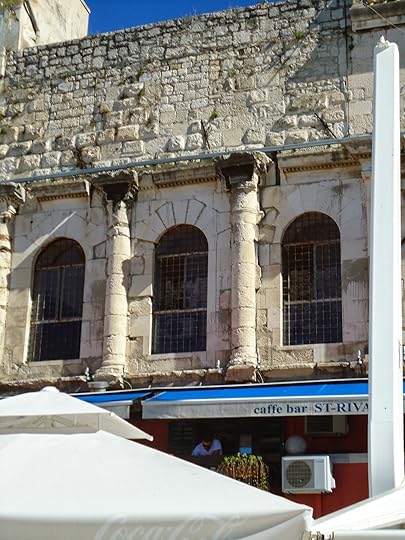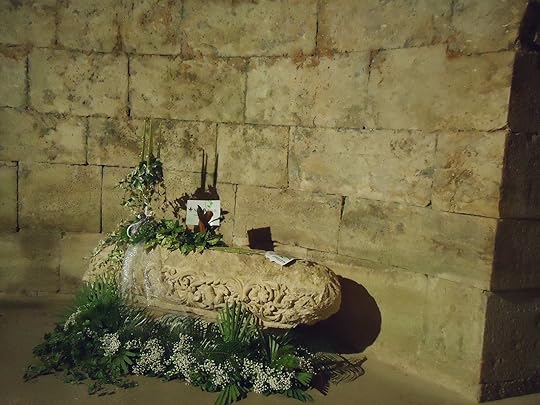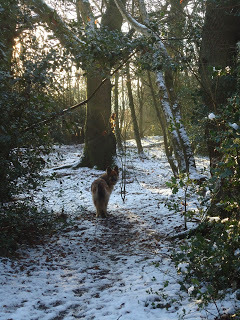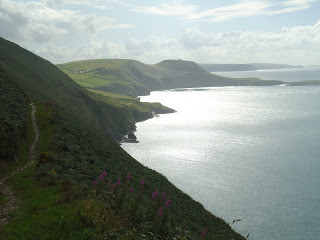Gillian Bradshaw's Blog
February 22, 2014
Diocletian's Palace
 Croatia was our main holiday destination last year; Diocletian's Palace in Split was top of my A list of things to see. It exceeded expectations.
Croatia was our main holiday destination last year; Diocletian's Palace in Split was top of my A list of things to see. It exceeded expectations.Gaius Aurelius Valerius Diocletianus was one of the most energetic and inventive of the emperors of Rome. He reigned from 284-305 AD. The latter date is that of his retirement, not his death: uniquely among emperors, he stepped down from supreme power, and spent the last decade of his life in retirement in the palace he built for himself on the beautiful Dalmatian coast, not far from the provincial capital of Salona. Unlike most buildings from the period, the palace survived. The photo below is of the windows of the emperor's private quarters--now a bar.

Some may think this rather a sad come-down for an emperor's bedroom, but if people hadn't moved in the palace would be only another ruin. The Roman buildings which survive more-or-less intact are the ones that people kept using and therefore kept repairing; those that were not still in use were left to fall down, or, more commonly, used as a source of brick and stone by later generations. (Or, of course, the ones which were buried under volcanic ash or river silt.) Roman Salona, the one-time capital of Dalmatia, suffered that fate.

Salona--now Solin--is a very interesting site, but--to me at least--nowhere near as interesting as the palace, and a large part of that interest is the way the old building was changed by new users. What happened is this: about a century after Diocletian died, the people of Salona abandoned their city: the Avars and Croats were invading, and Salona, some miles inland, was hard to keep supplied in a siege. The palace lay on the coast: it had a good harbour, a strong defensive wall, and ample barracks which had once provided accommodation for the emperor's guards. The Salonians moved in, and, over the centuries that followed, rebuilt and adapted the complex to suit their own needs.
Some of the things they did would have outraged the emperor, had he known of them. Diocletian was a great persecutor of Christians, but the mausoleum he'd built to be buried in was turned into a church; even worse, it was dedicated to St. Domnius, who was martyred by--errm--Diocletian. The temple near the mausoleum, dedicated to Jupiter, whom Diocletian claimed as his divine father, became a baptistery--though it retains its beautiful Roman vaulting.
 As the Dark Ages gave way to the Middle Ages, the palace became too small to contain the burgeoning population of the town; the walls were extended, then extended again. Split is now a big, busy, industrial city, and the palace is nothing more than its oldest part. It's where the tourists go, and instead of Roman guardsmen or Orthodox monks, the peristyle is full of people with cameras, with cafe bars and boutiques.
As the Dark Ages gave way to the Middle Ages, the palace became too small to contain the burgeoning population of the town; the walls were extended, then extended again. Split is now a big, busy, industrial city, and the palace is nothing more than its oldest part. It's where the tourists go, and instead of Roman guardsmen or Orthodox monks, the peristyle is full of people with cameras, with cafe bars and boutiques. The part of the palace which is least changed is its basement. The reason for this is simple: it was used as a sewer and rubbish tip for centuries, and until the archaeologists braved it, people left it well alone.
The part of the palace which is least changed is its basement. The reason for this is simple: it was used as a sewer and rubbish tip for centuries, and until the archaeologists braved it, people left it well alone.While we were there, the basement (now clean and tastefully illuminated) was being prepared for a flower show. The contrast between the fragile, ephemeral flowers and the old stones reminded me of the verses by Kipling:
Cities and Thrones and PowersStand in Time's eyeAlmost as long as flowers,Which daily die:But, as new buds put forthTo glad new men,Out of the spent and unconsidered EarthThe cities rise again.
This season's Daffodil,She never hearsWhat change, what chance, what chill,Cut down last year's;But with bold countenance,And knowledge small,Esteems her seven days' continuanceTo be perpetual.

Published on February 22, 2014 07:36
January 12, 2014
Libraries
 My new year's resolution is to write this thing at least once a month.
My new year's resolution is to write this thing at least once a month. The building above is Birmingham's new public library. Isn't it beautiful? It looks just as good inside, too.
 It has five floors of books, plus the city archives, plus a collection of music with a space for live performances; it has its own cafe and two roof-top gardens with fabulous views; it has space for special exhibits, for readings and performances for children, and for arts and crafts; it has an e-library and a lot of (free) online resources.
It has five floors of books, plus the city archives, plus a collection of music with a space for live performances; it has its own cafe and two roof-top gardens with fabulous views; it has space for special exhibits, for readings and performances for children, and for arts and crafts; it has an e-library and a lot of (free) online resources.In raising this marvellous building --the single largest public building project in Britain for several years--the city of Birmingham defied two pervasive trends. First--unlike most of the other striking buildings put up over the past decade--the library is for public, not private/corporate use; and second, Birmingham is investing in a library while most councils are closing them down.
I admit that an author enthusing over libraries is a bit like a dog enthusiastically devouring food: if it didn't happen, you'd suspect something was wrong. Like most avid readers, I was taken to the local library before I could even toddle, and every week of my childhood I came away with a handful of books. Oh, I soon discovered bookshops as well, but bookshops are restaurants or foodie outlets, providing exotic meals: libraries are the family dining table. They provide reading matter day in, day out, whether or not you have funds. They provide the staple food that keeps the mind alive.
Or they used to. Increasingly we are told that, in this digital age, they aren't as important as they once were; that now people can look things up online, and order anything they like from Amazon. Library budgets are an easy target for a cash-strapped council. All over Britain libraries are being closed down; even when they stay open, the funds they have available to buy new books are limited. Hours of opening are wrenched about; every penny has to be justified; 'unpopular' books are ruthlessly sold off because of limited space.
The digital argument is disingenuous. Yes, you can look things up online--if you have a computer. If you don't, the only place you're likely to get online for free is your local public library--if it hasn't been closed down. As for buying books--alas, they aren't cheap. The amount I spend on books makes me value libraries more, not less.
'A library,' said the philanthropist Andrew Carnegie, 'outranks any other one thing a community can do to benefit its people. It is a never failing spring in the desert,' and 'There is not such a cradle of democracy upon the earth as the Free Public Library.' He put his money where his mouth was, too, and endowed hundreds of libraries across Britain--including my local branch library which just celebrated its centenary.
Birmingham's beautiful new library has been packed every time I've visited it. I hope it prospers; I hope that it, too, will one day celebrate its centenary. A world bereft of libraries would be a desert indeed.
Published on January 12, 2014 08:26
July 29, 2013
Names
 (Yes, I know. It's been months. What can I say? I'm still suffering from writers' block. I most fervently wish it were otherwise.)
(Yes, I know. It's been months. What can I say? I'm still suffering from writers' block. I most fervently wish it were otherwise.)The picture above is of a common weed. As you can see, it is not particularly pretty. I nonetheless allot it a space in the garden--corner of the fence, near the clematis--where it can flourish undisturbed. Why? I discovered that it bears the name of 'enchanter's nightshade'--and how could I eradicate from my garden a plant with a marvellous name like that?
Wildflowers often have wonderful names: 'traveller's joy', 'heartsease', 'viper's bugloss'. Disappointingly, however, the names don't always seem to fit the plant very well. Take this one:
 It's much more attractive than enchanter's nightshade, but its name is sneezewort. If I were writing a story and I wanted to evoke a beautiful meadow, I could not very well describe it as full of sneezewort, toadflax, pignut and ragwort. It would create the wrong impression--even though all those flowers are exceptionally pretty ones.
It's much more attractive than enchanter's nightshade, but its name is sneezewort. If I were writing a story and I wanted to evoke a beautiful meadow, I could not very well describe it as full of sneezewort, toadflax, pignut and ragwort. It would create the wrong impression--even though all those flowers are exceptionally pretty ones.Names in books are awkward. They automatically create expectations in the reader. An action-man hero called 'Nigel' or 'Julian' would be laughed at; romantic heroines are unlikely to be named 'Sue'. If an author names a character 'Daisy' or 'Buttercup', the girl's either going to be a simple country lass or the author is playing games.
When I'm writing a historical novel I usually compose lists names as I do the preliminary research--subdivided by sex and origin, so that I have a list of, say, 'Roman British Male Names' and 'Roman British Female Names' and 'North African Male Names' and so on; then, when a character appears for the first time I run down my list and pick something that seems to fit. Often I discover that another character who appears later fits that name better, and then I have to go back and rename the first one. (When I started writing, this was a matter of checking and retyping: 'Find and Replace' is ever such a nice command!) Sometimes a character is hard to name. I once wrote the first chapter of a book with the main character and first person narrator written as *** because I couldn't make up my mind what to call him. As for books themselves--either they have a name almost from the moment they're conceived, or I can't think of a title at all, and end up exchanging suggestions with the publishers.
Of course, the most important task of naming is one most of us do at some point: naming a new baby. The rules to that, however, are very different to those that govern the naming of a character in fiction. You don't worry about fictional characters being bullied at school: you may even assign that fate to them, as part of fleshing them out. Babies are much closer to the heart.
Published on July 29, 2013 10:17
April 5, 2013
Thieves and Hitmen
 The other night the dog--the lovely beastie above-- may have scared off a burglar. We don't know that for certain, of course: all we know was that she made a lot of noise in the middle of the night, and there was a corresponding sound at the back door. It's possible, though: we were burgled twice during the first two years after we first moved into this house, but in the twelve years since we got a dog we've had no trouble. Good dog!
The other night the dog--the lovely beastie above-- may have scared off a burglar. We don't know that for certain, of course: all we know was that she made a lot of noise in the middle of the night, and there was a corresponding sound at the back door. It's possible, though: we were burgled twice during the first two years after we first moved into this house, but in the twelve years since we got a dog we've had no trouble. Good dog!By chance I'd been reading a moderately entertaining fantasy novel about a thief, and it brought home to me the stark contrast between attitudes to theft in fiction and in everyday life. Thieves are very popular as fictional heroes, and not just in fantasies. From Robin Hood to Raffles to modern thrillers, they're cast as dashing outsiders who dare to take on the powers-that-be; their victims are usually depicted as stodgy snobs who can easily afford to lose both cash and dignity. I enjoy a good heist movie as much as the next person, but sometimes I wonder: have the scriptwriters never been burgled?
The first time we were burgled, I lost the contents of my jewellery box. Most of the stuff in it wasn't particularly valuable--my great-grandmother's pearl earrings might have been, but even their value in cash was a pittance compared to their value as a family heirloom passed down four generations. The worst loss, though, was of a little butterfly necklace, not valuable at all except for the fact that it had been bought by my father for my daughter when she was eighteen months old and he was dying of cancer. It was the only gift she would have from him, and it was probably sold it to a dodgy second-hand shop for a pound or two, the money used to buy dope.
That, of course, is the sad truth about thieves: most of them are not suave jewel thieves swanning about on yachts in the Med. No, they're pimply adolescents or smelly drunks, snatching whatever they can to feed their addiction, and their victims aren't high society snobs but ordinary people. The statistics are clear, too: poor people suffer more regularly than rich ones. I am sorry about that butterfly necklace, but even more sorry about the playstation taken from an acquaintance's mentally handicapped son: it was his greatest pleasure, and when it went he curled into himself and gave up.
Theft is nasty; it requires an absolute indifference to the effect of the theft on the victim--and that's just burglary. Robbery, which by definition involves violence, is worse. In real life we know this: we exclaim in horror and sympathy about the friend or acquaintance mugged; we know all about the visits to A&E and the often-debilitating after-effects--the fear of going out, the depressions, the panic attacks. In fiction, however, we're happy to cheer for the gunman during the stick-up. We're even willing to make heroes of hitmen, as numerous films and books have proven.
Of course, we don't really approve of murder, let alone cold-blooded murder undertaken by a professional for a fee. Violence is and always has been a staple of fiction because it fascinates: we're afraid of it, and sometimes tempted by it; it is dramatic, exciting and scary. It's natural to want to tell stories about it. I just wish, though, that our stories were more truthful. After all, thieves watch movies, too, and I suspect that they find the false glamour comforting.
Published on April 05, 2013 04:58
March 2, 2013
Spring
Yes, I know. I didn't manage a blog in February. February is to blame: a wet, muddy misery of a month when the most exciting thing that happened was being struck down by flu.
Now, however, it is March: the first month of spring, according to the Met Office. It's true that for the next three weeks there will still be more darkness than light, but the light has been increasing and before the end of the month it will gain the upper hand. It hasn't rained for a week, and the quagmires of the local woods are beginning to dry. Daffodils are in bud, crocuses are just opening, and the snowdrops are in full flower.

Diffugere nives, redeunt iam gramina campis
arboribusque comae;
mutat terra vices, et descrescentia ripas
flumina praetereunt , as Horace put it--or, in Housman's rendering,
The snows are fled away, leaves on the shaws
And grasses in the mead renew their birth,
The river to the river-bed withdraws,
And altered is the fashion of the earth.'
I always find it odd that students of English think Robert Graves was a great classicist and are surprised to hear that classicists don't think much of him, but revere A E Housman. Graves, of course, is famous for the 'I, Claudius' novels. I don't actually like them--I find the style flat, the female characters impossible, and the historical accuracy not what it ought to be. (You can't believe everything you read in Suetonius!) He is also famous for the 'White Goddess', a hypothesis about matriarchy and syncretistic goddesses which has virtually nothing behind it except the author's imagination. Housman, in contrast, wrote a learned commentary on Manilius which has Latinists swooning with admiration, and an emendation by 'Hous' in the apparatus criticus of any text provokes reverent attention.
Both men wrote poetry, and I love the poetry of both--though if I had to choose I'd opt for Housman again, especially in this season.
Since to look at things in bloom
Fifty springs are little room,
About the woodlands I will go
To see the cherry hung with snow.
Now, however, it is March: the first month of spring, according to the Met Office. It's true that for the next three weeks there will still be more darkness than light, but the light has been increasing and before the end of the month it will gain the upper hand. It hasn't rained for a week, and the quagmires of the local woods are beginning to dry. Daffodils are in bud, crocuses are just opening, and the snowdrops are in full flower.

Diffugere nives, redeunt iam gramina campis
arboribusque comae;
mutat terra vices, et descrescentia ripas
flumina praetereunt , as Horace put it--or, in Housman's rendering,
The snows are fled away, leaves on the shaws
And grasses in the mead renew their birth,
The river to the river-bed withdraws,
And altered is the fashion of the earth.'
I always find it odd that students of English think Robert Graves was a great classicist and are surprised to hear that classicists don't think much of him, but revere A E Housman. Graves, of course, is famous for the 'I, Claudius' novels. I don't actually like them--I find the style flat, the female characters impossible, and the historical accuracy not what it ought to be. (You can't believe everything you read in Suetonius!) He is also famous for the 'White Goddess', a hypothesis about matriarchy and syncretistic goddesses which has virtually nothing behind it except the author's imagination. Housman, in contrast, wrote a learned commentary on Manilius which has Latinists swooning with admiration, and an emendation by 'Hous' in the apparatus criticus of any text provokes reverent attention.
Both men wrote poetry, and I love the poetry of both--though if I had to choose I'd opt for Housman again, especially in this season.
Since to look at things in bloom
Fifty springs are little room,
About the woodlands I will go
To see the cherry hung with snow.
Published on March 02, 2013 09:20
January 16, 2013
Realism in the New Year
Yes, I know. I haven't written this since September. I was feeling disheartened about the whole business. However, it's a new year, so I suppose I should resolve to write this at least once a month.
The thing that provided the impetus to blog again was this: http://www.bbc.co.uk/news/magazine-20910859, which got me thinking about realism in fiction. It isn't news, of course, that crime fiction is not, generally speaking, very realistic (though I love the statistic that Cabot Cove's murder-rate is half again as high as the very worst figure in the real world.)
I don't suppose that people read Agatha Christie for realism. They enjoy the puzzle, the period, the stylized speech and characters: the murders are just an excuse. I think, though, that certain other crime writers do claim to be 'realistic', sometimes even 'gritty'. This usually means a lot of graphic medical details and a lot of sex, violence, and substance abuse. I'm not sure, though, that this sort of 'realism' reflects the world most of us inhabit much more than Christie does. Even on the bleakest housing estates, most people do not engage in drug dealing, prostitution or murder, and most of those who do don't do so all the time. In any life, there's much, much more tedium than drama. The thing that really makes fiction 'unrealistic' is the way that tedium gets left out--because, after all, who wants to read about watching telly and doing the laundry?
'Gritty' historical fiction can be as unrealistic as the criminal variety. I remember visiting a Norman castle near Saffron Walden which was fitted with wax figures supposedly informing the visitor about medieval life. Of perhaps twenty of these, there were four or five who were not being hanged, tortured, or suffering monstrously at the hands of doctors. Yes, of course, medieval people were hanged and tortured and did suffer monstrously at the hands of doctors--but mostly they worked on the land, raised kids, baked and brewed and cooked dinner, talked, told stories, argued, fell in love, went dancing or to church--in short, lived lives. Books which represent life in the past as all violence and cruelty misrepresent reality as badly as those which treat it as a romantic idyll.
The thing that provided the impetus to blog again was this: http://www.bbc.co.uk/news/magazine-20910859, which got me thinking about realism in fiction. It isn't news, of course, that crime fiction is not, generally speaking, very realistic (though I love the statistic that Cabot Cove's murder-rate is half again as high as the very worst figure in the real world.)
I don't suppose that people read Agatha Christie for realism. They enjoy the puzzle, the period, the stylized speech and characters: the murders are just an excuse. I think, though, that certain other crime writers do claim to be 'realistic', sometimes even 'gritty'. This usually means a lot of graphic medical details and a lot of sex, violence, and substance abuse. I'm not sure, though, that this sort of 'realism' reflects the world most of us inhabit much more than Christie does. Even on the bleakest housing estates, most people do not engage in drug dealing, prostitution or murder, and most of those who do don't do so all the time. In any life, there's much, much more tedium than drama. The thing that really makes fiction 'unrealistic' is the way that tedium gets left out--because, after all, who wants to read about watching telly and doing the laundry?
'Gritty' historical fiction can be as unrealistic as the criminal variety. I remember visiting a Norman castle near Saffron Walden which was fitted with wax figures supposedly informing the visitor about medieval life. Of perhaps twenty of these, there were four or five who were not being hanged, tortured, or suffering monstrously at the hands of doctors. Yes, of course, medieval people were hanged and tortured and did suffer monstrously at the hands of doctors--but mostly they worked on the land, raised kids, baked and brewed and cooked dinner, talked, told stories, argued, fell in love, went dancing or to church--in short, lived lives. Books which represent life in the past as all violence and cruelty misrepresent reality as badly as those which treat it as a romantic idyll.
Published on January 16, 2013 06:22
September 9, 2012
Walking and Hiking
 I like walking.
I like walking.I've just come back from walking some the Ceredigion Coastal Path (visible on the left side of the photo above.) It was stunningly beautiful: gorse and heather; the sea on our left the colour of jade, dappled with blue-slate cloud shadows; red kites and kestrels over the cliffs, gray seals in rocky bays, an adder sunning itself on the path. Of course, it rained all day once, and some of the descents were mud ski-runs--but nothing's perfect. The Welsh coast in sunlight in so near perfection that you're unlikely to see anything better on earth.
We did about fifty miles over five days, which is walking for wimps, particularly when you consider that we were staying in comfy B&Bs and had our luggage shifted from one of these to the next by a luggage transfer service. You walk; you arrive and have a cup of tea; you go out to dinner in the local pub; you sleep well and get up in the morning to a large breakfast that sets you up for another day of walking: what could be more pleasant? The proliferation of long-distance footpaths (and luggage transfer services) in the past twenty years shows that I'm not the only one who thinks so. Local councils like them because they bring people into the area for days at a time, and these people spend money on B&Bs, pubs and local attractions; walkers like them because there's always a new one to try out.
Walking for wimps is a great British tradition, and one that sets the UK apart from the United States. In the United States they don't walk for recreation: they hike. It's much more energetic. Fit young people carrying enormous back packs yomp across glorious national parks, camping in the wilderness and covering at least a couple dozen miles a day. It's admirable, but it requires rather more of the hiker than a my 10-mile-a-day walk, let alone the usual gentle loop through the countryside with a pub-stop halfway.
Actually, I think that's a pity: it means far fewer Americans walk. Of course, in most of the United States streets and cities are laid out in such a way as to actively discourage walking. Shops are inaccessible except by car; footpaths outside parks nonexistent; private land is fiercely defended and trespassers really will be prosecuted. It's very different from Britain, where the public right of way (the dotted green lines of that other great British institution, the Ordnance Survey maps) gives everyone free access to the (green-belt protected) countryside.
 A few years ago we did in walk in Michigan, in the Upper Peninsula, which was one of the most stunning I've ever done. An easy track through the forest brought one to a magical little beach, where a natural rock arch plunged into the turquoise water of Lake Superior, and a little waterfall provided a natural shower. From there another easy track led along the top of the Pictured Rocks National Shoreline--a magnificent series of cliffs, arches, and pillars in multi-coloured layers of stone. Then came another beach, and a level trail back through the forest (where blueberries and raspberries grew wild in abundance) to the carpark. The whole circuit was officially nine miles; I think this was a crow-flies figure, and the real figure was closer to twelve, but still, it was a walk even wimps could easily do over a day, with breaks for picnics, snacks, and swimming. We did it in August, in beautiful weather. The National Park which enclosed this gem was packed with campers, all three enormous campsites full (we know this, because we tried and failed to find a place). We met only two other people on the cliffs.
A few years ago we did in walk in Michigan, in the Upper Peninsula, which was one of the most stunning I've ever done. An easy track through the forest brought one to a magical little beach, where a natural rock arch plunged into the turquoise water of Lake Superior, and a little waterfall provided a natural shower. From there another easy track led along the top of the Pictured Rocks National Shoreline--a magnificent series of cliffs, arches, and pillars in multi-coloured layers of stone. Then came another beach, and a level trail back through the forest (where blueberries and raspberries grew wild in abundance) to the carpark. The whole circuit was officially nine miles; I think this was a crow-flies figure, and the real figure was closer to twelve, but still, it was a walk even wimps could easily do over a day, with breaks for picnics, snacks, and swimming. We did it in August, in beautiful weather. The National Park which enclosed this gem was packed with campers, all three enormous campsites full (we know this, because we tried and failed to find a place). We met only two other people on the cliffs.This is undoubtedly the premier walk in the state, probably the best within a five hundred mile radius: in Britain it would've been packed--like Dovedale, say, or Snowdon on a Bank Holiday. While it was wonderful having it to ourselves, I find it very sad that others weren't enjoying it as well. Walking, in my opinion, is a much better option than hiking.
Published on September 09, 2012 06:46
August 23, 2012
What to do about the next book
It's been over a month since the last post. The reason for this is simple: I've been writing. The bad news is that I haven't been writing the book I should have been writing.
I'm sorry! I know most of my readers enjoy my historical fiction. I enjoy researching it and I've loved writing it, but for the past few years I seem to have been running into the sand, and I finally got irretrievably stuck.
Perhaps it was a mistake to change period? My training is as a classicist, and that is still the period I love most. I did feel, though, that I was getting stale, recycling some of the same material from book to book, and that I needed to challenge my brain with a completely different period--hence the English Civil War. I did like my two Civil War novels, but I don't think they're as good as the best of my classical books. On the other hand, I don't feel my last few classical books were as good as my best, either, which is why I made the change in the first place.
I should spell this out: I have always done my very best with every book I've written. When a book is not as good, this isn't because I've cut corners or failed to invest the time and energy it needed: it's because I was unable to make it any better. Sometimes there were structural elements pulling in different directions, sometimes I couldn't get the plot quite right, sometimes the lightning just failed to strike where it was needed--but the failures have never been down to will and commitment. If any readers have been disappointed, I can only apologize and say that I did the best I could.
My last published book, A Corruptible Crown was particularly demotivating: the publishers cut it by ten percent to save printing costs. Now, I don't think my words are holy writ; in fact, I believe that most books, including mine, benefit from cutting. In the past I've been happy to cut: Dark North is only about three fifths of its original length. A Corruptible Crown , however, was not a fat book--it was quite pared down to begin with--and my publishers weren't pretending that the cuts they made were to improve the novel: they were made explicitly to save money. I suppose even so about 30% of what they did improved the book and another 20 or 30% was neutral. That did leave, however, 40 or 50% of the cuts being into red meat--things which were in the book for a good reason, and which caused damage when they were taken out. I know that they, like all publishers, are struggling with the harsh economics of printing in an increasingly digital world--but for me this was, as I said, extraordinarily demotivating. Why should I sweat and struggle to make a book as good as I possibly can, if the publishers are willing to cut it to a Not-what-it-should-have-been?
My first response to this was to e-publish a couple of fantasies that I'd written to unwind, liked a lot, but failed to sell. (No printing costs! I can put in as much or as little as I like!) They earned very little, but the books got more stars and more reviews than the printed ones. I still didn't feel like tackling the next historical, so I wrote a couple more. Then I started another historical, intended to finish off the 17th C. themes I'd dealt with in the two civil war novels. I did a lot of research, embarked on it--and got stuck on chapter two. I then wrote nothing for about a year--which was unprecedented for me, and depressing.
Now, as I said, I'm deep in another novel and happy as a cow in clover--except, as I said, it's not a book I should be writing, it's another bloody fantasy, and probably destined to go straight to Kindle. It's different from the last ones, it lets me play around with different viewpoints and some fun ideas--but it's not what I wanted to write or what my small band of followers wanted to read.
So, if you're a member of that small but elite band--I'm sorry! Maybe after this I'll be able to do a proper book again.
I'm sorry! I know most of my readers enjoy my historical fiction. I enjoy researching it and I've loved writing it, but for the past few years I seem to have been running into the sand, and I finally got irretrievably stuck.
Perhaps it was a mistake to change period? My training is as a classicist, and that is still the period I love most. I did feel, though, that I was getting stale, recycling some of the same material from book to book, and that I needed to challenge my brain with a completely different period--hence the English Civil War. I did like my two Civil War novels, but I don't think they're as good as the best of my classical books. On the other hand, I don't feel my last few classical books were as good as my best, either, which is why I made the change in the first place.
I should spell this out: I have always done my very best with every book I've written. When a book is not as good, this isn't because I've cut corners or failed to invest the time and energy it needed: it's because I was unable to make it any better. Sometimes there were structural elements pulling in different directions, sometimes I couldn't get the plot quite right, sometimes the lightning just failed to strike where it was needed--but the failures have never been down to will and commitment. If any readers have been disappointed, I can only apologize and say that I did the best I could.
My last published book, A Corruptible Crown was particularly demotivating: the publishers cut it by ten percent to save printing costs. Now, I don't think my words are holy writ; in fact, I believe that most books, including mine, benefit from cutting. In the past I've been happy to cut: Dark North is only about three fifths of its original length. A Corruptible Crown , however, was not a fat book--it was quite pared down to begin with--and my publishers weren't pretending that the cuts they made were to improve the novel: they were made explicitly to save money. I suppose even so about 30% of what they did improved the book and another 20 or 30% was neutral. That did leave, however, 40 or 50% of the cuts being into red meat--things which were in the book for a good reason, and which caused damage when they were taken out. I know that they, like all publishers, are struggling with the harsh economics of printing in an increasingly digital world--but for me this was, as I said, extraordinarily demotivating. Why should I sweat and struggle to make a book as good as I possibly can, if the publishers are willing to cut it to a Not-what-it-should-have-been?
My first response to this was to e-publish a couple of fantasies that I'd written to unwind, liked a lot, but failed to sell. (No printing costs! I can put in as much or as little as I like!) They earned very little, but the books got more stars and more reviews than the printed ones. I still didn't feel like tackling the next historical, so I wrote a couple more. Then I started another historical, intended to finish off the 17th C. themes I'd dealt with in the two civil war novels. I did a lot of research, embarked on it--and got stuck on chapter two. I then wrote nothing for about a year--which was unprecedented for me, and depressing.
Now, as I said, I'm deep in another novel and happy as a cow in clover--except, as I said, it's not a book I should be writing, it's another bloody fantasy, and probably destined to go straight to Kindle. It's different from the last ones, it lets me play around with different viewpoints and some fun ideas--but it's not what I wanted to write or what my small band of followers wanted to read.
So, if you're a member of that small but elite band--I'm sorry! Maybe after this I'll be able to do a proper book again.
Published on August 23, 2012 02:40
July 14, 2012
Overwhelmed
 The literal sense of 'overwhelm' is to submerge or sink. 'Save me, O God, for . . .I am come into deep waters, where the floods overflow me!' The past week I've been overwhelmed both literally and in the more common metaphorical sense of experiencing more things than I can process at once, as I have just learned to scuba dive.
The literal sense of 'overwhelm' is to submerge or sink. 'Save me, O God, for . . .I am come into deep waters, where the floods overflow me!' The past week I've been overwhelmed both literally and in the more common metaphorical sense of experiencing more things than I can process at once, as I have just learned to scuba dive.It is something I'd wanted to do for a long time, but the reality was vastly greater than my imaginings. To begin with, I hadn't anticipated the exhiliration of descent: one sinks slowly beneath the waves and keeps breathing! It defies millions of years of evolutionary history, and the shock is glorious. Then there's the weightlessness: one hovers mid-water, rising and falling with a breath, flying in a way otherwise experienced only in dreams. Finally there's the world undersea--and here I was particularly lucky, because I was diving in the Red Sea, where the coral gardens form one of the richest ecosystems on the planet.
 This is where the metaphorical overwhelming comes in. Normally arrival in a new place is exhausting and enlivening at the same time. The ordinary is replaced by the unfamiliar, and the mind races, tracking everything--landscape, buildings, plants and animals, smells--comparing them to the familiar ones at home. Time seems to pass more slowly as attention speeds up. Descending underwater for the first time, however, there is so much that is new and strange that the mind can't process it. The landscape is stranger than anything in Star Wars: pinnacles which bulge out overhead, covered in multi-coloured fans and corals like exposed brains, swarming with jewel-like fish, so many of them that at first it seems impossible to sort them. Everywhere one looks is something extraordinary, and the mind is overpowered, unable to distinguish between the commonplace and the exotic, the significant and the trivial, released into a child-like wonder at everything.
This is where the metaphorical overwhelming comes in. Normally arrival in a new place is exhausting and enlivening at the same time. The ordinary is replaced by the unfamiliar, and the mind races, tracking everything--landscape, buildings, plants and animals, smells--comparing them to the familiar ones at home. Time seems to pass more slowly as attention speeds up. Descending underwater for the first time, however, there is so much that is new and strange that the mind can't process it. The landscape is stranger than anything in Star Wars: pinnacles which bulge out overhead, covered in multi-coloured fans and corals like exposed brains, swarming with jewel-like fish, so many of them that at first it seems impossible to sort them. Everywhere one looks is something extraordinary, and the mind is overpowered, unable to distinguish between the commonplace and the exotic, the significant and the trivial, released into a child-like wonder at everything.By the end of the week I was beginning to make distinctions again: those fish are common, but that one is unusual; look under that ledge, there might be lionfish! I suspect that with experience I'd start to feel as expert as some of the other divers I met--but I very much doubt I could ever feel jaded. They certainly didn't: the woman with 656 dives in her log seemed just as enthusiastic as me with my 7 or 8.
Diving in the Red Sea is popular--probably too much so, for the safety of the reefs. I was told that there used to be corals close to the beaches, but that they were all killed by the process of building all the tourist hotels which now make Hurghada and its environs a 60 km long building site. Now divers go out to the reefs by boat, and six or seven dive boats frequently moored at the same spot--even in these days when tourism in Egypt is suffering. All along the coast are hotels with swimming pools, shops selling souvenirs, restaurants and bars. Most of the guests at these hotels don't dive, but for those who do diving is readily available, and not all the operators are as responsible and careful as those who introduced me to the world underwater. (For the record--since one of the pleasures of blogging is being able to acknowledge debts--I am very grateful to Regaldive, to the Divers' Lodge at Hurghada, and to my able instructor Reda Elshishtawy, who took the photographs.) One does worry about how well these marvels can survive, between the pressures of climate change and the careless minority of sightseers. Their loss would be inestimable, like the destruction of a great museum or superlative cathedral--worse, because we would have records of the art works lost, but the reefs are living things which could never be restored.
Published on July 14, 2012 10:12
June 21, 2012
A song of unsung heroes
I've recently added a new item to the list of sites I check every day. It is, to my surprise, the Olympic Torch Relay. When I first looked at the route it was taken and saw that it was going to go everywhere, I thought that this was overkill; what was more, I thought that it would devalue the whole enterprise, because--as W.S. Gilbert put it in The Gondoliers, 'If everyone is somebody, then no-one's anybody.' If you have 8000 torchbearers what's the distinction worth?
I was quite wrong. I love the relay. In part it's the pictures: the torch abseiling down bridges, riding steam trains, crossing Hadrian's Wall, up the summit of Snowdon and over the Giant's Causeway, like some stupendous campaign to persuade people to visit Britain. Most of it, though, it's the torchbearers. It's true that some of them are the usual suspects--B-list celebrities, the nominees of corporate sponsors and the relatives of IOC members--but most of them are people who have made a difference in their local communities but who we would never otherwise have heard of at all. Many are sportsmen and women--but not the sort who win medals. They are, instead, the people who make sport work: PE teachers, coaches in local football or rugby, the secretaries of running and cycling clubs, people who put in long hours of effort for no money and little recognition. There are schoolkids, too, who put in hours training and show huge sportsmanship, but are never going to win anything outside their hometown.
Other torchbearers--the kind I find most inspiring of all--are ordinary people who have shown extraordinary courage or generosity. They have raised thousands of pounds for charity, worked with disadvantaged children, set up support systems for families dealing with crippling diseases. Some have had the fortitude to cope with some of those same diseases, and are carrying the torch despite Parkinsons, or MS; carrying it in wheelchairs or on crutches.
Every day uncovers uncelebrated stories. A Josephine Loughren who carried the torch yesterday loved running, but gave up half of a lung to help her sister, who had cystic fibrosis. Lucy Gale, a hired car driver, came across a car accident on a railway line, and, in the two and a half minutes available before a heavily-laden freight train arrived, managed to get both cars and drivers off the line, saving, certainly, their lives, and, possibly, the lives of others in the passenger train that would have been derailed if the freight train had crashed. Mia Rathband, daughter of PC David Rathband who was blinded in the line of duty and killed himself, ran blindfolded in honour of her father.
The Torch Relay is on the BBC website, and it's a strange experience to go from the rest of the news, which is, almost by definition, bad, to this bald account of altruism and quiet heroics. I don't dare read it in public, because I cry too easily.
The torch arrives here in Coventry on the 1st of July. There will be a celebration in the park across the road, and I will certainly be there, cheering.
I was quite wrong. I love the relay. In part it's the pictures: the torch abseiling down bridges, riding steam trains, crossing Hadrian's Wall, up the summit of Snowdon and over the Giant's Causeway, like some stupendous campaign to persuade people to visit Britain. Most of it, though, it's the torchbearers. It's true that some of them are the usual suspects--B-list celebrities, the nominees of corporate sponsors and the relatives of IOC members--but most of them are people who have made a difference in their local communities but who we would never otherwise have heard of at all. Many are sportsmen and women--but not the sort who win medals. They are, instead, the people who make sport work: PE teachers, coaches in local football or rugby, the secretaries of running and cycling clubs, people who put in long hours of effort for no money and little recognition. There are schoolkids, too, who put in hours training and show huge sportsmanship, but are never going to win anything outside their hometown.
Other torchbearers--the kind I find most inspiring of all--are ordinary people who have shown extraordinary courage or generosity. They have raised thousands of pounds for charity, worked with disadvantaged children, set up support systems for families dealing with crippling diseases. Some have had the fortitude to cope with some of those same diseases, and are carrying the torch despite Parkinsons, or MS; carrying it in wheelchairs or on crutches.
Every day uncovers uncelebrated stories. A Josephine Loughren who carried the torch yesterday loved running, but gave up half of a lung to help her sister, who had cystic fibrosis. Lucy Gale, a hired car driver, came across a car accident on a railway line, and, in the two and a half minutes available before a heavily-laden freight train arrived, managed to get both cars and drivers off the line, saving, certainly, their lives, and, possibly, the lives of others in the passenger train that would have been derailed if the freight train had crashed. Mia Rathband, daughter of PC David Rathband who was blinded in the line of duty and killed himself, ran blindfolded in honour of her father.
The Torch Relay is on the BBC website, and it's a strange experience to go from the rest of the news, which is, almost by definition, bad, to this bald account of altruism and quiet heroics. I don't dare read it in public, because I cry too easily.
The torch arrives here in Coventry on the 1st of July. There will be a celebration in the park across the road, and I will certainly be there, cheering.
Published on June 21, 2012 06:40
Gillian Bradshaw's Blog
- Gillian Bradshaw's profile
- 320 followers
Gillian Bradshaw isn't a Goodreads Author
(yet),
but they
do have a blog,
so here are some recent posts imported from
their feed.



